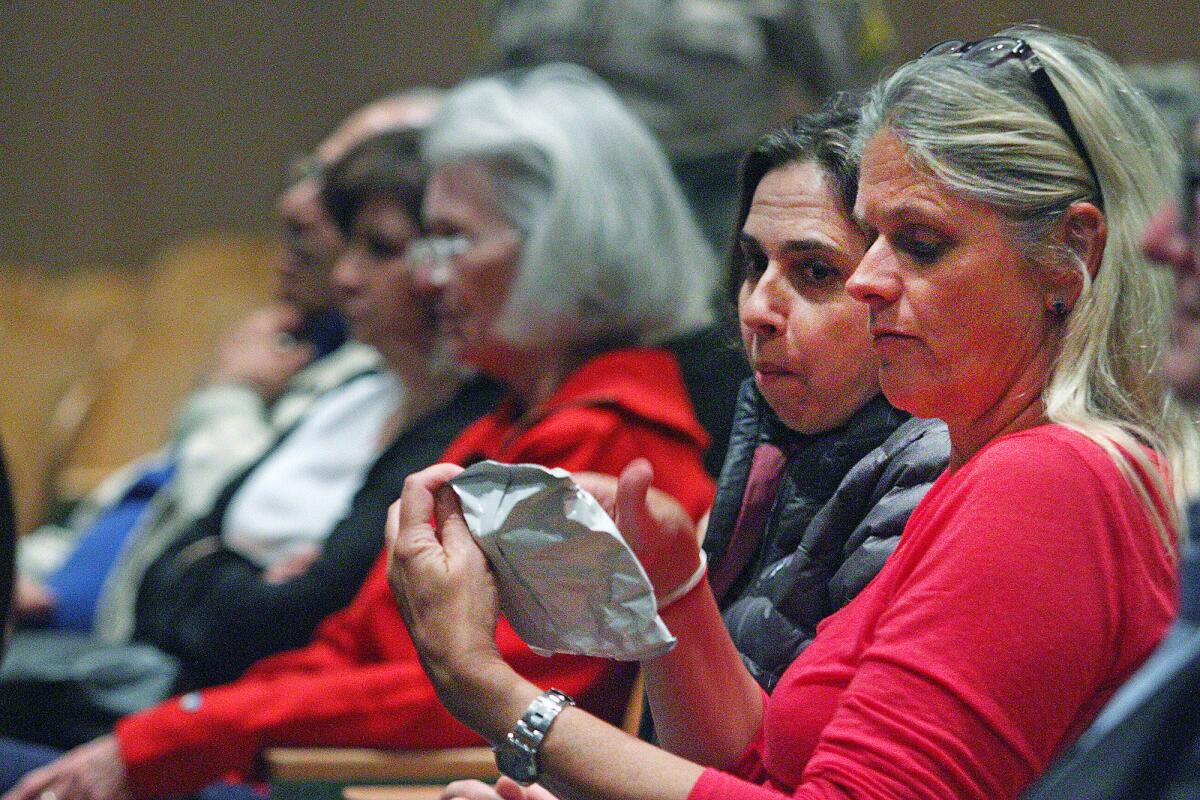Crescenta Valley Sheriff’s Station committee hosts forum to examine local drug trends

Dorothee Kruegermann, of La Crescenta, gets a close look at a drug testing kit at a drug discussion called “Drug Trends in Our Community” by the Crescenta Valley Sheriff’s Station’s Community Advisory Group on Monday, April 11, 2016. Topics included observing the signs of drug use, drug testing resources, e-cigarettes and parties.
- Share via
Vincent Dioguardi was 11 years old and hanging out at a friend’s house when he first encountered marijuana. His friend had taken some of his dad’s stash and asked if he wanted to try some.
“Without hesitation, I said yes,” Dioguardi recalled. “From that point on, everything in my life changed.”
NEWSLETTER: Stay up to date with what’s going on in the 818 >>
That experience set off a spiral of addiction that would last the next four years as Dioguardi continued smoking pot, “fell in love with” cocaine at age 13 and began selling drugs to other teens.
His parents tried changing schools, from La Cañada High to St. Francis and then back again, hoping to correct their son’s troubling behavior without knowing drug use was behind it. It wasn’t until about six months ago, when they caught Dioguardi in the basement smoking pot and insisted on checking his cellphone communications, that the harsh truth came to light.
“I looked my mom in the eyes and I remember saying, ‘I have an issue,’” the now 15-year-old sophomore recounted. “I thank God every day that day happened.”
Today, celebrating five months of sobriety — with the help of intervention from Action Family Counseling in Pasadena — Dioguardi wants other families in the Foothills to understand how easy it is for kids to get hooked on drugs and what parents can do to recognize warning signs and respond immediately.
The teen shared his personal experiences with addiction and recovery Monday evening at Lanterman Auditorium in a forum, “Drug Trends in Our Community,” hosted by the Crescenta Valley Sheriff’s Station Community Advisory Committee.
The voluntary citizens group partners with the local branch of the Los Angeles County Sheriff’s Department to bring crime and safety-related issues to light in a number of public events held throughout the year.
Monday’s talk was intended to update parents on current drug trends and how to recognize paraphernalia, devices and the subtle signs of drug use. Led by Deputy Eric Matejka, who works closely with La Cañada Unified’s school resource officer, the discussion included lots of visuals, many taken directly from the hands of local students.
“Look at what your kids are doing,” Matejka advised parents. “Look at changes in friends, if they’re staying out late, if they’re more protective of their phones, if they’re hiding stuff. If you see this stuff, be suspicious of it.”
The deputy passed around drug-testing kits, pipes for smoking marijuana, meth and other substances and devices used to hide drugs in plain view. Parents closely examined and even sniffed at the items for reference.
Matejka suggested parents create a bond of trust with their children by speaking openly about drugs and alcohol and creating agreements about what to do if and when an encounter should occur. Telling your kids you plan to drug test them on an ongoing basis gives them a ready-made excuse to opt out of joining in with friends in a peer pressure scenario, he added.
Angel Duke-Shirvanian, a program manager with Action Family Counseling and a former addict, estimated about 60% of teen clients at the Pasadena location come from La Cañada and La Crescenta. She advised parents to check teens’ clothing, phones and computers and take a proactive role in setting a good example.
“Our kids learn from us. We’ve got to be very careful in the examples we’re showing at home,” she said. “The best thing you could do is what you’re doing right now, educating yourselves.”
Kasia and Art Chmielewski, parents of a La Cañada High School eighth-grader and junior at La Cañada, said afterward they came to learn more and be better prepared for whatever their sons might encounter.
Kasia Chmielewski said she was saddened to hear Dioguardi’s story, that something like that could go on for years without parents knowing. Art Chmielewski said he was surprised only 150 parents turned out.
“I feel scared for the other 1,800 who were not here,” he added. “Parents are successful, parents are affluent and they think they’re kids are smart and they’ll stay away (from drugs). They don’t think about the danger their kids face. I would like to see every parent of every child from La Cañada High School here next time.”
--
Sara Cardine, sara.cardine@latimes.com
Twitter: @SaraCardine
--
ALSO:
